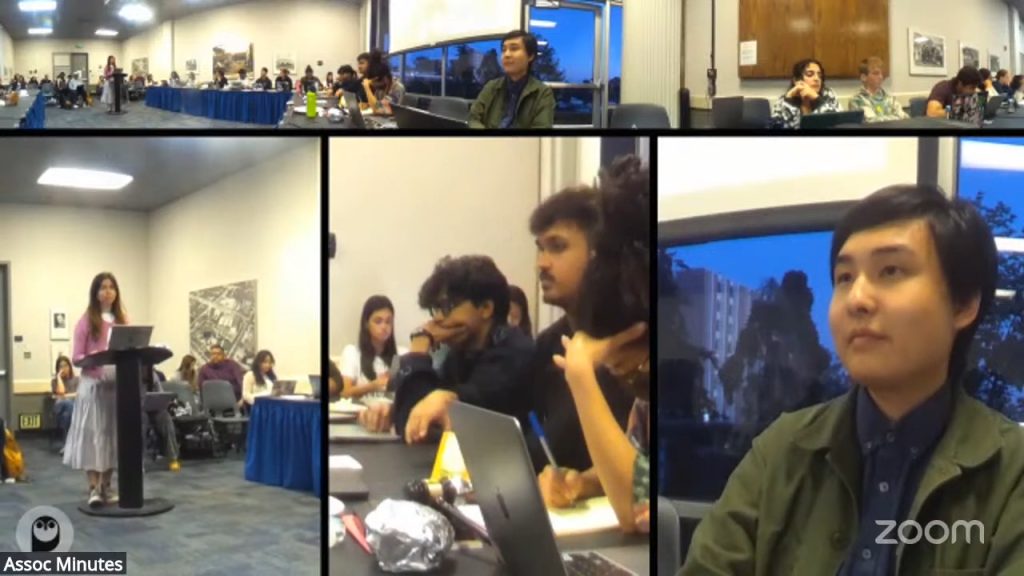AS Senate Recap – 4/9/25
This recap first appeared in the April 15 edition of the KCSB News Weekly Newsletter.
The AS Senate is a group of elected student representatives which serves as the policy-making body of Associated Students. Every Wednesday at 6:30 PM, the AS Senate convenes to pass bills and resolutions, hear reports from Boards, Committees, and Units (BCUs), and hold public forum.
KCSB’s Joyce Chi summarizes their most recent meeting on April 9, 2025.
Le Anh Metzger of COSWB (bottom left) discusses a proposed BCU recruitment policy. | Photo credit: Courtesy (ASUCSB YouTube)
The Senate faced a question of conflict of interest in regards to the upcoming Spring General Election. It all starts with Attorney General Eric Carlson asking the Senate to grant an exception to a key deadline for students to declare their intentions of running for AS elected office.
Carlson asked on behalf of one student hoping to run for AS President but who had missed that March 5 deadline. It’s worth noting that the eventual directive to grant the exception (which, spoiler alert, didn’t pass) would’ve applied to multiple student candidate hopefuls.
Confidentiality prevented specifics as to why the student did not submit their declaration of candidacy in time. Senator Dalia Gerson argued that life and unexpected circumstances should not prevent someone who wants to contribute to AS from doing so.
Conversely, Senator Sandy Ganesh expressed concern that this bid for a position as important and powerful as AS President felt like an “afterthought.” In response, Carlson shared that although he ran for IVP last year, he was unable to campaign effectively because his dog passed away: “It’s not necessarily an afterthought; it’s simply a balancing of priorities.”
Any student declaring choice candidacy now (more than a month after the original deadline) would be missing out on weeks of preparation, Senator Paolo Brinderson pointed out. (By the way, “choice” candidates are the ones who appear as a listed, multiple-choice option on the ballot.)
Both Brinderson and Ganesh suggested the students submit write-in candidacy declarations as a middle ground, out of fairness to candidates who had submitted their declarations in time. (If you were like me and also curious about this…Yes, write-in declarations are needed for write-in votes to count. So in other words, a thousand written-in votes for Storkie wouldn’t count unless Storkie submitted their write-in candidacy declaration.)
Due to technical issues that prevented submission of election-related material, the Elections Board extended several deadlines, including for write-in candidates, until April 16. The deadline was also extended for choice candidates to submit their ~headshots~ and biographies, as the Senate directed them to.
EB Vice Chair Ihita Varada confirmed that the Board wasn’t looking to extend the deadline for choice candidates. Any student tossing their hat in the ring now as a choice candidate, Varada explained, would have missed out on orientations and workshops to help them properly campaign. (Remember, voting opens up next week. Time flies…)
One rather important point: for most positions, there is no competition. Now, let me start this next section by saying this is certainly not a knock against any of these candidates, and I commend any undergrad who wants to get involved with student government. (Yay for civic engagement!)
But these are the facts. Four out of five executive positions – AS President, Internal Vice President (IVP), External Vice President for Statewide Affairs (EVPSA), and Student Advocate General – have only one candidate, according to the Elections Board website. (There are two candidates currently running for External Vice President for Local Affairs [EVPLA].)
According to Attorney General Carlson, there’s a “financial gain” to be had: these executive positions get paid a total of $10,000 a year. That breaks down to $3k for each fall, winter, and spring quarters, and $1k for the summer. Meanwhile, Senators can only earn a maximum of $600 per quarter.
The same story of no competition, which Carlson called an “illusion of free choice,” also applies to some seats within next year’s Senate. 12 students are running for 12 available Off-Campus Senator positions. There can be five On-Campus Senators, but only two students are running. It’s a similar picture for next year’s International and Off-Campus University-Owned Senators, though the Transfer Senator and Letters & Science Senator positions are competitive. (No candidates are listed for the College of Creative Studies Senator.)
Carlson and Senator Jasmine Amin also noted that having more candidates could encourage voter turnout, and Carlson highlighted the fact that Senator Caroline Lankarani received 800 votes last year due to their large network.
Some current Senators are running for these uncontested positions both in the Senate and within the Executive Branch. Thus, the question is, should the Senate be voting on exceptions that would let in more choice candidates – and thus, more competition?
The student Carlson was seeking the exception for wanted to run for president, and the AG also mentioned that Elections Board received similar requests from different students. However, EB Vice Chair Varada declined to say if those exception-seeking students were running for other uncontested positions too.
“I don’t think it’s a bad thing to give people more choices,” Senator Taylor Iden said. “I think it’s pretty accurate to say there’s an abundance of conflict of interest in this room.”
To break out the rule book… Standing Policy 15 of AS Legal Code defines conflict of interest as “personal financial gain, personal gain of associates,” or an unresolvable “conflict in the interests of ASUCSB with the interests of other” campus groups.
Senator Amin also said that though some current Senators aren’t running for office next year, there could be a conflict of interest just by virtue of working with and being friends with their Senate colleagues who are running.
On the other hand, Senator Enri Lala, the only listed candidate for IVP, argued that conflict of interest was an arbitrary definition that could be too expansive, since AS is so interconnected.
Internal Vice President Açúcar Pinto said they didn’t see a conflict of interest and if Elections Board wanted to grant the exception, they could.
The Senate eventually voted not to direct Elections Board to grant the deadline exception. (But again, Elections Board later approved a deadline for write-in candidates — not choice candidates.)
When it comes to the $10k-a-year executive positions…Senator Dan Siddiqui, who will appear as the only listed candidate for AS President, eventually recused himself from the vote. (We did see a sign posted that Le Anh Metzger, co-chair of the Commission on Student Well-Being (COSWB), is running a campaign for president as a write-in candidate.) Senators Lala and Leiya Kadah, the only choice candidates for IVP and EVPSA respectively, voted no. (Lala declined to comment on the motion. Siddiqui and Kadah did not respond to our requests.)
AG Carlson said he felt the rejection of the motion amounted to “disenfranchisement.” Though he declined to go into the specifics, he told us his office was preparing multiple cases for the Judicial Council in part to “guarantee the integrity of our elections.”
In a phone call, Carlson also raised concerns over the Senate again suspending a Standing Policy that prevents Senate candidates to proxy for a current Senator (a debate of allowing candidates to gain experience vs. preventing them from having undue influence).
–
The recruitment and hiring process for some BCUs could look different. A new policy from the Senate Executive Committee would require Boards, Commissions/Committees, and Units (BCUs) to thoroughly publicize their chair, vice chair, and co-chair positions for the 2025-2026 school year to all students, through measures like university-wide emails and social media posts. Senator Ganesh, who chairs the Liaison Committee, said that “if you are funded by student fees, you are to advertise your jobs to all students.”
Concurrently, an email explaining the policy said the Senate would seek to implement a “recruitment pause” within the Association for next year’s positions, in order to check in with each individual BCU on how their hiring process was going. Interviews for next year’s BCU chairs, in consultation with the group’s current chairs, would start in Week 7 of this quarter through early summer; from there, chairs would finish recruiting other board members by Fall Quarter.
“This is a process to help BCUs who need that help,” said Ganesh. “We are not going to overhaul recruitment and completely strip autonomy.” Senator Siddiqui added that BCUs “actually doing their recruitment process correctly” would not be impacted. Meanwhile, Senator Taylor Iden pushed for a slower implementation, one that next year’s Senate should take on.
BCU chairs pushed back on the proposed policy. Delaying the recruitment process into the summer and fall would interfere with summer workshops and training, said Environmental Affairs Board chair Hattie Ellison. Mikaela Wilson, chair of the Isla Vista Tenants Union, said it would slow down their internal operations and take time away from projects benefiting students and IV residents. Others criticized the tight turnaround of the email, which was sent seven hours before the Senate meeting would be discussing the new policy. COSWB co-chair Metzger argued that students who applied for chair positions but were not previously involved in those BCUs would essentially be wasting their time, since current BCU board members would likely be favored.
No action on the proposed policy, and no such hiring freeze, was taken at the April 9 meeting. The Liaison Committee is set to continue with consultations and individual outreach to BCUs.
–
A Deltopia update, brought to us by EVPLA Owen Meyers and UCIV chair Samira Casillas: The UCIV tent saw 10k visitors and passed out 5k water cups, 1.2k units of Narcan, and 600 units of fentanyl test strips. Citations increased 52% from the previous year, according to Meyers, and the majority of the 80 arrests that day were for public intoxication.
Meyers expressed frustration that law enforcement did not at first let representatives of UCIV and the Isla Vista Community Services District (IVCSD) through road closures and that police stood by the recovery center at the IVCSD to carry out arrests and hand out citations, though he said their roles to support partygoers that day was overall “very highly successful.”
–
The Senate passed a motion to ask Judicial Council to determine the legality of a financial recommendation. In order to properly pay for professional staff in AS, a Report on AS Long-Term Financial Continuity by Senators MingJun Zha and Arayaman Singh and AS Chief Compliance Officer David Jr. Sim suggests asking BCUs to dedicate part of the funds collected from their lock-in fees to fund professional staff salaries.
The report explains that most professional staff are paid by the AS Undesignated Fee, which also helps fund BCUs without their own lock-in fees and which hasn’t been raised since passing in 2006. All BCUs, the report argues, “are enjoying the benefit of AS staff support, ranging from advising to requisition and overall governmental structure.”
The Senate tabled A Bill to Amend the COSWB Legal Code for one week. The bill, brought by Senators Ganesh and Yasmine Suuck at the request of COSWB, updates wording and duties. It also would add two new coordinator positions focusing on culture & inclusivity and community outreach.
Access this week’s AS Senate agenda (which includes their bills and resolutions) using your student email here. You can see last week’s agenda here. Meetings are typically held each week at the Flying A Room of the University Center (Main Floor) throughout the quarter, aside from Week 10. You can also watch live and past meetings on Facebook here.

